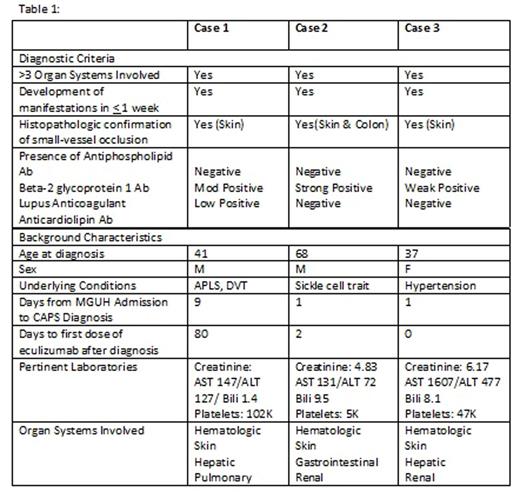Abstract
Catastrophic antiphospholipid syndrome (CAPS) is a rare, often fatal phenomenon. Patients present with a wide range of symptomatology including thrombotic microangiopathy, cytopenias and end organ damage. The mortality rate of CAPS is as high as 33% in spite of the use of combination therapies including steroids, anticoagulation, plasma exchange (PEX) and intravenous immunoglobulin (Cervera CA 2009; Espinosa G 2011; Bucciarelli S 2006). CAPS is believed to be a disorder of complement-mediated inflammation which results in tissue injury. The proposed mechanism of the thrombotic microangiopathyisthe interaction of the coagulation cascade and complement (Mehdi AA 2010). Multiple murine-based studies demonstrate the contribution of C5a to antiphospholipid antibody-mediated intravascular thrombosis (Fischetti F 2005; Pierangeli SS 2005; Giannakopoulos B 2013). Eculizumab is a humanized monoclonal antibody that binds to C5 and inhibits its cleavage to C5a and C5b. It is FDA approved for the treatment of the complement mediated disorders paroxysmal nocturnal hemoglobinuria and atypical hemolytic uremic syndrome.
We present 3 cases of CAPS treated with eculizumab at our institution. Their individual diagnostic criteria and background characteristics are outlined in Table 1.
Case 1: 41-year-old male with history of antiphospholipid syndrome on chronic anticoagulation presented with fevers and ventilatory-dependent respiratory failure. Upon transfer to our institution, he developed thrombocytopenia and left hand mottling; doppler revealed a radial artery thrombus. Biopsy of the involved area of skin indicated thrombotic microangiopathy. Pulse dose steroids and unfractionated heparin were initiated. He was extubated within 24 hours and fever resolved. He remained dyspneic and mildly thrombocytopenic and therefore rituximab was initiated. Oxygen requirements, liver dysfunction, and thrombocytopenia resolved. As the prednisone dose was tapered, new microangiopathic lesions were noted. The decision was made to start eculizumab which is ongoing as a maintenance dose every two weeks with no clinical recurrence of CAPS.
Case 2: 68-year-old male presented with priapism. On day 2 of hospitalization, he was found to have left lower extremity (LLE) DVTs and received unfractionated heparin. On day 4, he developed fever and thrombocytopenia and was noted to have a cold LLE. Angiography demonstrated occlusion of the posterior tibial artery and heparin was discontinued in favor of an alteplase drip. The patient was subsequently transferred to our institution. Doppler demonstrated multiple DVTs in both lower extremities. Evaluation for HIT was negative. Lupus anticoagulant (LA) was strongly positive raising concern for CAPS. Steroids and PEX were initiated. However, emergency fasciotomy of the RLE was needed to relieve compartment syndrome. Skin biopsy demonstrated microangiopathy. Due to lack of clinical improvement, PEX was discontinued and eculizumab was initiated. On day 3 post-eculizumab initiation, there was evidence of regression of skin mottling. Eculizumab was redosed on day 5. Steroids were tapered and he received 2 additional doses of eculizumab. No additional thrombotic complications occurred. He eventually died during this hospitalization due to septic shock.
Case 3: 37-year-old female presented with fever, hypoxia, and painful feet. She was hypotensive and labs demonstrated leukopenia, thrombocytopenia, elevated liver enzymes, and acute kidney injury. Vasopressors and antibiotics were initiated. Over the next 24 hours she developed mottling of her feet, face and breasts. The diagnosis of CAPS was made based on clinical criteria and a positive LA. Unfractionated heparin, steroids and eculizumab were initiated. Dialysis was started due to renal failure. Skin biopsy showed microangiopathy. Marked improvement of skin mottling was noted after 3 doses of eculizumab and renal function normalized after 7 doses. She was discharged with a slow steroid taper, therapeutic enoxaparin, and maintenance eculizumab.
Complement blockade with eculizumab is safe and effective in patients with CAPS. These cases suggest that utilizing therapy to inhibit the complement pathway may be an integral component in treating CAPS more effectively. Future directions should include a randomized clinical trial to evaluate eculizumab as part of combination therapy for CAPS.
Broome:True North Therapeutics: Honoraria; Alexion Pharmaceuricals: Honoraria.
Author notes
Asterisk with author names denotes non-ASH members.


This feature is available to Subscribers Only
Sign In or Create an Account Close Modal